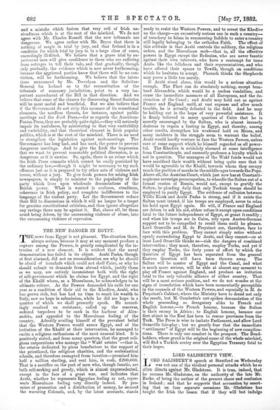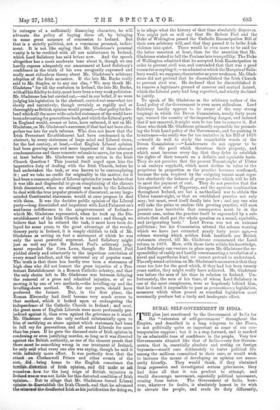LORD SALISBURY'S VIEW.
TORD SALISBURY'S speech at Stratford on Wednesday 4 was not one of the virulent personal attacks which he so often directs against Mr. Gladstone. It is true, indeed, that he accuses Mr. Gladstone, on the authority of the late Mr. Burke, of being the author of the present chaos and confusion in Ireland ; and that he supports that accusation by assert- ing that on four separate occasions Mr. Gladstone has taught the Irish the lesson that if they will but indulge in outrages of a sufficiently dismaying character, he will advocate the policy of buying them off, by bringing in some great measure of concession to Ireland. But that is a strictly political, not a venomous personal, indict- ment. It is not like saying that Mr. Gladstone's personal vanity is to be credited with all our misfortunes in Ireland, which Lord Salisbury has said before now. And the speech altogether has a more moderate tone about it, though we can hardly express adequately our amusement at Lord Salisbury's confidence in the truth of his own arrogantly expressed and really most ridiculous theory about Mr. Gladstone's arbitrary adoption of the Irish measures. If the late Mr. Burke really said to Mr. Staples, or to any one else, " We may thank Mr. Gladstone" for all the confusion in Ireland, the late Mr. Burke, with all his fidelity to duty, must have been a very weak politician. Mr. Gladstone has but carried out,—and in our belief, if we were judging his legislation in the abstract, carried out somewhat too slowly and tentatively, though certainly as rapidly and as thoroughly as British opinion would permit,—that policy for Ire- land which all the more wide-minded statesmen of the world have been advocating for generations back, and which the Liberal party in England would, sooner or later, have enforced, if not on Mr. Gladstone, on Mr. Gladstone's successor, if that had not been alto- gether too late for such reforms. Who does not know that the Irish Protestant Establishment had been condemned in the abstract, by every statesman of large mind and Liberal views, for the last century, at least,—that English Liberal opinion had been growing more and more impatient of these abstract condemnations and these concrete refusals to move, for ten years at least before Mr. Gladstone took any action in the Irish Church Question This journal itself urged upon him the imperative duty of dealing with the Irish Church, before he had undertaken the task, or was known to be contemplating it ; and we take no credit for originality in the matter, for it had been a common-place of Liberal opinion for years before that it was idle and disgraceful to go on complaining of the chronic Irish discontent, when no attempt was made by the Liberals to deal with the true popular grounds of discontent, as any large- minded Continental statesman would at once propose to deal with them. It was the decisive public opinion of the Liberal party—long dissatisfied and impatient with Lord Palmerst on's assiduous indifference to the misgovernment of Ireland— which Mr. Gladstone represented, when he took up the Dis- establishment of the Irish Church in earnest ; and though we believe that had he refused the task, it must have been de- layed for some years, to the great advantage of the revolu- tionary party in Ireland, it is simply childish to talk of Mr. Gladstone as setting on foot a movement of which he was only the most powerful exponent. Lord Salisbury might just as well say that Sir Robert Peel's arbitrary judg- ment repealed the Corn Laws, though Sir Robert Peel yielded slowly and reluctantly to the imperious conviction of every sound intellect, and the universal cry of popular want. The truth is that there has hardly ever been a statesman of high class who did not lament the gross injustice of a Pro- testant Establishment in a Roman Catholic country, and that the only choice left to Mr. Gladstone was between delaying the removal of a gross and admitted injustice, or of re- moving it by one of two methods,—the levelling-up and the levelling-down method. We, for our parts, should have preferred the former. But, in the first place, the Roman Hierarchy had itself become very much averse to that method, which it looked upon as endangering the independence of the Catholic Church in Ireland ; and next, the great mass of English Liberals were more profoundly pre- judiced against it, than even against the grievance as it stood. Mr. Gladstone chose the only method substantially open to him of rectifying an abuse against which statesmen had been in full cry for generations, and all sound Liberals for more than ten years. If he gave the diseased state of Irish opinion in condoning or even justifying murder, so long as it was directed against the British authority, as one of the clearest proofs that there must be something wrong in our treatment of Ireland, he only said what every one else was saying, though he said it with infinitely more effect. It was perfectly true that the attack on Clerkenwell Prison and other events of the sort, did. bring home to the English conscience the terrible..distortion. of Irish opinion, and did make us ask ourselves how far the long reign of British injustice in Ireland was or was not liable for this distorted condition of Irish opinion. But to allege that. Mr. Gladstone forced Liberal opinion to disestablish the Irish Church, and that he advanced the criraesiof -the disaffected Irish as his justification for doing so, is to allege what the history of that time absolutely disproves. You might jest as well say that Sir Robert Peel and the Duke of Wellington passed the Catholic Emancipation Bill of their own arbitrary will, and that they passed it to bribe Irish violence into quiet. There would be even more to be said for the latter assertion at least, than for the assertion that Mr. Gladstone wished to lull the Fenians into tranquillity. The Duke of Wellington admitted that he accepted Irish Emancipation in order to prevent civil war, and contended that that was a good reason for accepting it,—an admission which the Marquis of Salis- bury would, we suppose, characterise as pure weakness. Mr. Glad- stone did not pretend that he disestablished the Irish Church to prevent civil war. He declared that -he disestablished it to remove a legitimate ground of rancour and mutual hatred, which the Liberal party had long regretted, and wholly declined to justify.
To speak of Mr. Gladstone as the arbitrary author of the Land policy of the Government is even more ridiculous. Lord Salisbury hardly appears to be aware of the very strong language in which the Devon Commission, nearly forty years ago, warned the country of the impending danger, and insisted that if not removed, it might soon be too late to remove it. But those who think Mr. Gladstone primarily reponsible for promot- ing the Irish Land policy of the Government, and for pushing it to extremes—he really was far too tentative in his Bill of 1870 —would do well to study the remarkable words of the Devon Commission :—" Landowners do not appear to be aware of the peril which threatens their property, and which must increase every day that they defer to establish the rights of their tenants on a definite and equitable basis. They do not perceive that the present Tenant-right of Ulster is an embryo copyhold, which must decline in value to the proprietor in proportion as the practice becomes confirmed, because the sum required by the outgoing tenant must regu- late absolutely the balance of gross produce which will be left to meet the payment of rent. They do not perceive that the disorganised state of Tipperary, and the agrarian combination throughout Ireland, are but a methodised war to obtain the Ulster tenant-right, or that an established practice not only may, but must, erect itself finally into law ; and any one who will take the pains to analyse this growing practice, will soon perceive how inevitable that consequence must be in the present case, unless the practice itself be superseded by a sub- stitute that shall put the whole question on a sound, equitable, and invigorating basis." Lord Devon was not an extreme politician ; but his Commission uttered the solemn warning which we have just extracted nearly forty years ago,—a solemn warning which neither Irish landlords nor British statesmen obeyed, till Mr. Gladstone commenced the Land reform in 1870. How, with these facts within his knowledge, Lord Salisbury can venture to place upon Mr. Gladstone the re- sponsibility of rashly and hastily consummating a revolution of a novel and superfluous kind, we cannot pretend to understand. The only sound criticism on Mr. Gladstone's measures is that they came too late for the good which, if they had but been twenty years earlier, they might really have achieved. Mr. Gladstone was before the men of his time in relation to Ireland. Un- fortunately, the men of his time, of whom Lord Salisbury is one of the most conspicuous, were so hopelessly behind him, that he found it impossible to pass as precautionary legislation, measures which when passed as remedial legislation must necessarily produce but a tardy and inadequate effect.



































 Previous page
Previous page